The global spacesuit market size was valued at $0.75 billion in 2021, and is projected to reach $1.5 billion by 2031, growing at a CAGR of 7.3% from 2022 to 2031.
A spacesuit is a complex system of clothing, equipment, and environmental systems that are designed to keep astronauts alive and comfortable in the harsh environment of space. It protects astronauts from the dangers of being in space. Spacesuits help astronauts in many ways. Suits protect astronauts from being extremely hot or cold. Spacesuits also provide oxygen for astronauts working in space. It also protects astronauts from being injured by space dust. The suit is even equipped with a special gold-lined visor to protect the eyes of the astronaut from bright sunlight.
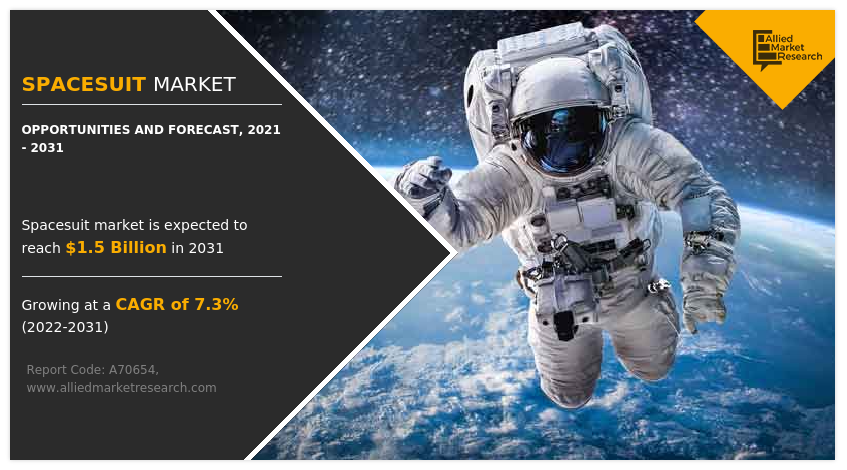
A fully equipped space suit is a one-man spacecraft. The official name for the spacesuits used on the Space Shuttle and the International Space Station is the Extravehicular Mobility Unit or EMU. "External Vehicle" means the exterior of a vehicle or spacecraft. "Mobility" means that the astronaut can move around in the suit. Spacesuits protect astronauts from the dangers of space.
In addition, a space suit is made up of various parts. One part covers the chest of the astronaut, while another part covers the arms and connects to the gloves. The helmet protects the head. The helmet is equipped with a visor that provides protection for the astronaut's face and eyes from harmful radiation, micrometeoroids, and other debris. The spacesuit has a life support system Life which provides astronauts with a continuous flow of oxygen, allowing them to breathe in the vacuum of space. This system usually includes a portable oxygen supply. Life support systems help keep astronauts comfortable and regulate the temperature inside the suit to prevent overheating or hypothermia.
Factors such as rise in space exploration programs, increase in the space industry budget, and advancements in material science boost the growth of the spacesuit market. However, high manufacturing and maintenance cost, and a lack of standardization is anticipated to hinder market growth. On the other hand, growth in space tourism provides a remarkable growth opportunity for the market players operating in the market.
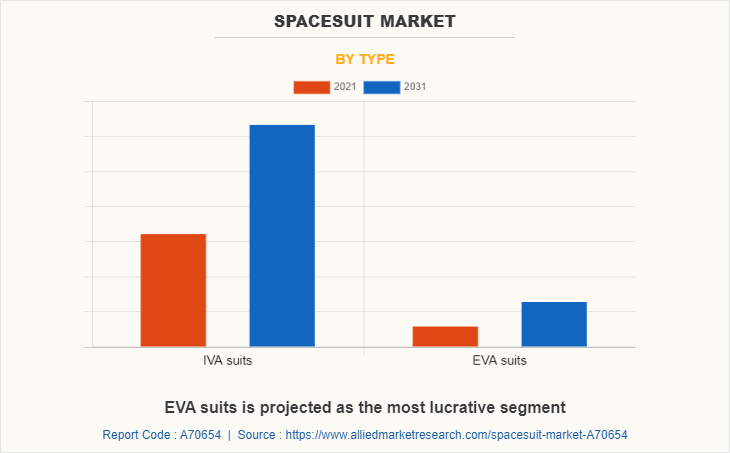
The spacesuit market is segmented on the basis of type, material, end-use and region. By type, it is categorized into IVA suits, and EVA suits. By material, it is classified into soft shell, hard shell, and hybrid. By end-use, it is divided into spaceflight mission, and training. By region, the market is analyzed across North America, Europe, Asia-Pacific, and LAMEA.
North America includes the U.S., Canada, and Mexico. The rise in investment in space exploration by the U.S. government led to an increase in spacesuit development in the region. Private space companies in the region such as SpaceX and Blue Origin are investing in space exploration and building space stations. For instance, in October 2021, Blue Origin a spaceflight company unveiled its plan for a private space station called “Orbital Reef,” which it expects to deploy between 2025 and 2030. Such developments enable the design of spacesuits in space expedition activities which further is expected to accelerate the expansion of the market during the forecast period.
Europe includes the Germany, France, UK, Russia, and Rest of Europe. Factors such as technological advancements, national security concerns, and the need to support space exploration and commercial space activities are expected to drive the expansion of the market in the region. Moreover, several European countries, including France, Germany, Italy, Spain and the UK, are actively involved in manned space programs. These programs require advanced spacesuit technology to keep astronauts safe and comfortable during spacewalks and other tasks. In addition, the growth of the commercial space industry has created new opportunities for the development of spacesuit technology, which drives the growth of the market.
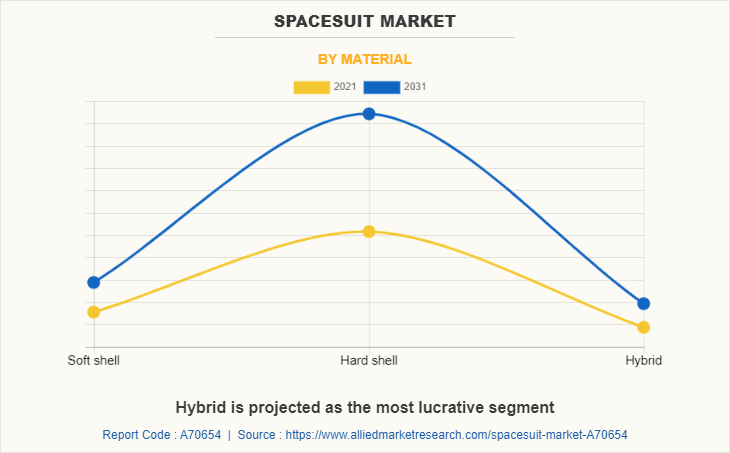
Leading manufacturers are aiming to increase the spacesuit market share with development of advanced spacesuits in the U.S. The advent of space travel and other commercial space activities in the country has increased the demand for spacesuits. Spacesuit is a critical garment for astronauts in space exploration activities. The development of spacesuits is essential to enable astronauts to survive and operate in the harsh environment of space. There is a growing demand for spacesuits for astronauts with the rise in collaboration between space agencies and aerospace companies to develop spacecraft. For instance, in April 2021, NASA awarded SpaceX, a space company, a $2.9 billion contract to build a spacecraft to carry astronauts to the moon. Such developments are expected to drive the demand for spacesuits in the country.
Moreover, Canada has created significant contributions to science and technology through space research and development. Canada is one of the International Space Station (ISS) partners, along with the U.S., Russia, Europe and Japan. Canadian astronauts are required to wear spacesuits to perform extravehicular activities (EVA) outside the ISS. Moreover, the rise in construction of space stations provides opportunities for the manufacturers to contribute to the development and manufacture of spacesuits. For instance, in December 2022, Voyager Space, a company engaged in space exploration, and the Canadian Space Agency (CSA) signed a Memorandum of Understanding (MoU) to jointly plan and develop Starlab, a Voyager's planned commercial space station. Such developments drive the growth of the spacesuit market in Canada.
Growing technological advancement in the material science is increasing the development and adoption of spacesuits which is expected to boost demand in the market. For instance, in June 2022, Paragon Space Development Corporation (Paragon) announced that it is part of the Axiom Space team which was awarded NASA's Exploration Extravehicular Activity (xEVAS) services contract. The 10-year contract is to develop the next-generation spacesuit which may be used for Artemis missions to the Moon and the International Space Station.
The leading spacesuit manufacturers are receiving contracts to design spacesuits for various missions which is expected to increase the development of spacesuits. For instance, in December 2022, Collins Aerospace (a Raytheon Technologies business), along with its partners ILC Dover and Oceaneering International, was awarded a contract to design, develop, and demonstrate the next-generation spacesuit for the International Space Station (ISS).
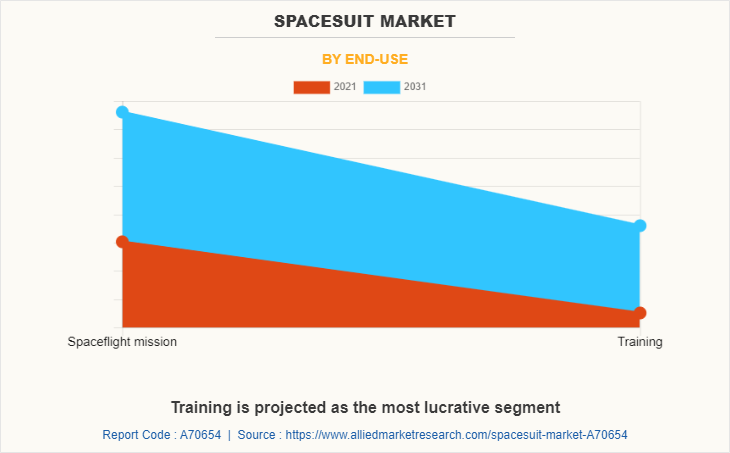
Some leading companies profiled in the spacesuit market report comprise Paragon Space Development Corporation, Oceaneering International, Inc., SpaceX, Boeing, David Clark Company Incorporated, ILC Dover LP, Vinyl Technologies, Inc., Raytheon Technologies Corporation, Pacific Spaceflight, and Sure Safety.
Rise in space exploration programs
Space agencies around the world are investing more in space exploration missions. For instance, NASA a space agency in the U.S. launched Artemis Program that aims to land the first woman and the next man on the Moon by 2024. The program includes the development of the Space Launch System rocket, the Orion spacecraft, and a lunar lander. The program also aims to establish a sustainable presence on the Moon by 2028. There is improvement in the technology used to develop spacesuits with the rise in space exploration program.
With each new mission, scientists and engineers gather valuable data and insights about the challenges astronauts face in space, which can be used to improve spacesuit design and functionality. An increase in variety of space missions require spacesuits that can be customized to meet the specific requirements of each mission.
The growth of space exploration programs has strengthened cooperation between the public and private sectors. Private companies are playing an increasingly important role in the development of spacesuits as they bring new technologies and ideas to the market. The proliferation of space exploration programs is accelerating the development of new technologies that can be used to improve the design and function of spacesuits, thus in turn driving the growth of the market.
Increase in the space industry budget
The rise in space budget allows the government of various countries to allocate more funds to spacesuit research and development. These funds can be used to research new materials, develop new technologies, and improve spacesuit design and functionality. For instance, in March 2023, the U.S. government released a budget for 2024. A budget of $8.1 billion is allocated to enable unprecedented lunar exploration activities. The budget also invests $39 million to better understand the orbital debris environment and explore approaches to ensuring safe access to space. Therefore, this could lead to the development of more advanced spacesuits to meet the needs of space exploration.
Moreover, spacesuit development requires extensive testing in specialized facilities that simulate conditions in space. The increase in the space budget provides more funding for the development and maintenance of these test facilities. This allows spacesuits to be thoroughly tested and validated before being deployed in space, improving safety and effectiveness. The high space budget also supports investment in human spaceflight which is expected to drive the growth of the market.
High manufacturing and maintenance cost
The development and manufacturing of spacesuits is a complex and expensive process that requires a significant investment of time, money, and resources. Developing new materials, techniques, and designs can be time-consuming and expensive, and the cost of manufacturing spacesuits in small quantities is high. Moreover, there is limited demand for spacesuits as demand for spacesuits is primarily driven by government space programs and the space travel industry.
Spacesuits must be designed to protect astronauts from the harsh environment of space, including extreme temperatures, radiation, and micrometeoroids. This requires the use of high-quality materials and advanced technology that can be expensive to develop and manufacture. Spacesuits are highly complex and require precision construction to ensure functionality and safety. Therefore, such factors increase the complexity and cost of the spacesuit which is expected to hinder the growth of the market.
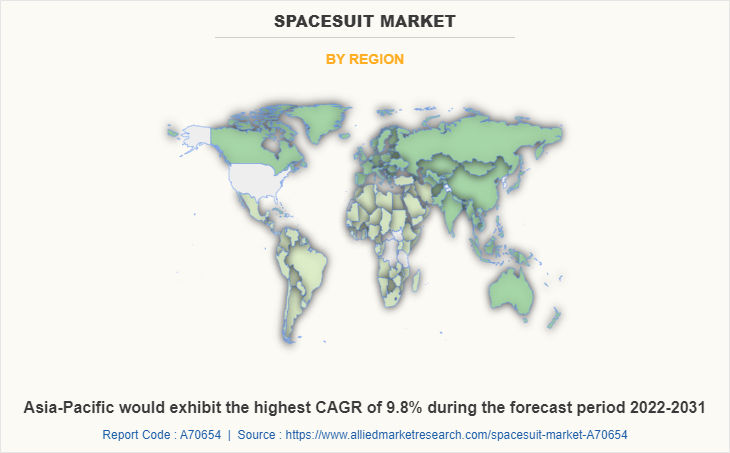
Growth in space tourism
The rise in space missions has increased interest in space travel among the general public. This has created a market for space travel as people are willing to pay for the opportunity to experience space travel for themselves. The growth of space travel has created new economic opportunities for businesses and governments. Advances in technology have made space travel more accessible to ordinary people. Companies like Virgin Galactic and Blue Origin are developing spacecraft that can carry passengers into orbit. This allows people to experience weightlessness and see the earth from a unique perspective.
For instance, in 2021, Virgin Galactic successfully completed its first fully crewed flight to space. Other companies in the space industry announced plans to offer space tourism flights in the future. Moreover, in February 2023, the Indian Space Research Organization (ISRO) announced its plans to launch space tourism Therefore, such developments are expected to provide significant opportunities for the growth of the market.
The spacesuit market is segmented into Type, Material and End-use.
Key Benefits For Stakeholders
- This report provides a quantitative analysis of the market segments, current trends, estimations, and dynamics of the spacesuit market analysis from 2021 to 2031 to identify the prevailing spacesuit market opportunities.
- The market research is offered along with information related to key drivers, restraints, and opportunities.
- Porter's five forces analysis highlights the potency of buyers and suppliers to enable stakeholders make profit-oriented business decisions and strengthen their supplier-buyer network.
- In-depth analysis of the spacesuit market segmentation assists to determine the prevailing market opportunities.
- Major countries in each region are mapped according to their revenue contribution to the global market.
- Market player positioning facilitates benchmarking and provides a clear understanding of the present position of the market players.
- The report includes the analysis of the regional as well as global spacesuit market trends, key players, market segments, application areas, and market growth strategies.
Spacesuit Market Report Highlights
| Aspects | Details |
| Market Size By 2031 | USD 1.5 billion |
| Growth Rate | CAGR of 7.3% |
| Forecast period | 2021 - 2031 |
| Report Pages | 349 |
| By Type |
|
| By Material |
|
| By End-use |
|
| By Region |
|
| Key Market Players | ILC Dover LP, Raytheon Technologies Corporation, Oceaneering International, Inc., Spacex, David Clark Company Incorporated, Pacific Spaceflight, Sure Safety, Vinyl Technology, Inc., paragon space development corporation, Boeing |
Analyst Review
The global spacesuit market is expected to witness growth owing to a rise in space exploration programs and an increase in commercial spaceflight missions.
Moreover, there has been an increase in space station missions and space exploration activities which is expected to accelerate the design and development of spacesuits. For instance, in 2021, NASA announced its plans to invest approximately $625.2 million in testing, and developments and to develop a suit for a show on the International Space Station (ISS) and two suits for the lunar mission that was planned for 2024, for a total cost of $1 billion.
In addition, there has been a rise in constant research to build lightweight and safe spacesuits. For instance, in February 2020, researchers from the University of South Dakota started a research project to develop a wireless sensor project to determine the health status of astronauts from the earth. This project includes the design of spacesuits equipped with carbon fiber wireless sensors. The aim of the project is to reduce the weight of the spacesuits and protect the astronauts from dangerous and unfriendly space environments.
Furthermore, there is a rise in demand for the advanced and customized design of spacesuits. For instance, in March 2022, NASA researched using 3D printing technology to manufacture custom spacesuit components for Mars exploration. This allows for greater flexibility in designing and building spacesuits, reducing production time, and reducing costs. Such developments to create flexible, durable, and comfortable for astronauts are expected to boost the growth of the market.
The estimated industry size of Spacesuit is $0.75 billion
The top companies to hold the market share in Spacesuit are Paragon Space Development Corporation, Oceaneering International, Inc., SpaceX, Boeing, David Clark Company Incorporated, ILC Dover LP, Vinyl Technologies, Inc., Raytheon Technologies Corporation, Pacific Spaceflight, and Sure Safety.
The largest regional market for Spacesuit is North America.
The upcoming trends of spacesuit market is growth in space tourism.
The leading type of spacesuit is IVA suit.
Loading Table Of Content...
Loading Research Methodology...



